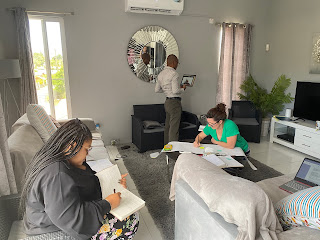According to my passport, the last time I was in Egypt was August 2019. I was three days from coming to Egypt in March 2020 when COVID-19 hit and all my plans were changed. Today, I arrived back in Cairo for the first time in nearly four years. I have heard "hamdella" [welcome] from those I know. It's a wonderful word.
I am here for two primary reasons:
1. Discussions with colleagues at the American University of Cairo, considered the best university in the region, regarding potential partnerships and research collaborations. I am meeting with multiple faculty members who have common research interests. I also have meetings with the director of the Education program who I have only met via video conferencing in the past. I am fortunate to have a colleague at Laurier who has a long history with ACU and who has nurtured these connections.
2. Ongoing work with Dover International School, a school that I have worked with for close to 10 years. The director is a former director of a school board in Ontario who I worked with in that context. He retired and took on the role of director of this international school. This May, we have 19 Laurier teacher candidates at Dover. Over the next few days, I'll be working with some of the teachers at Dover who I have had research projects with and also supporting our Laurier teacher candidates as they learn about teaching in a different context than Ontario.
There's always much to learn when you travel. For example, did you know that weekends in Egypt are on Friday/Saturday? The holy day is Friday. My learning will continue on this trip as I find out more about how educators in Egypt engage with topics such as school leadership, innovation, and inclusive education for students with disabilities.










